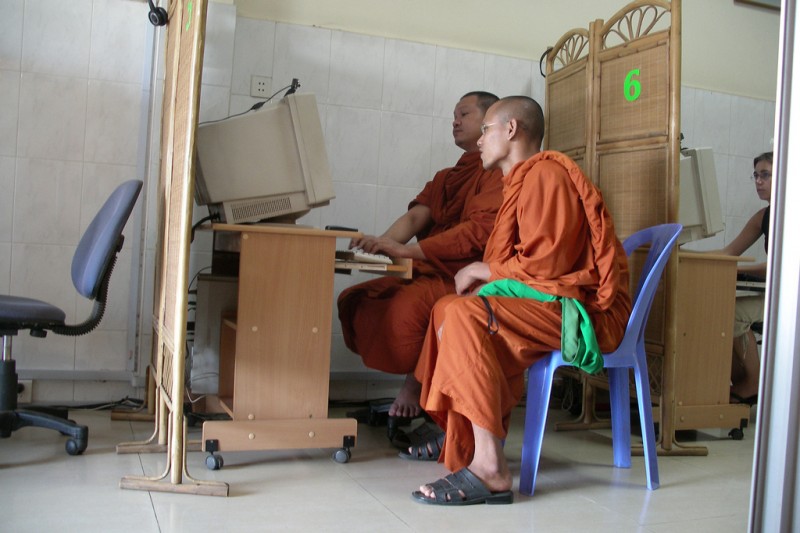Cambodian netizens and human rights groups are speaking out against an anti-cybercrime bill containing provisions that could undermine freedom of expression.
Although the government has refused to comment on the bill, London-based media advocacy group Article 19 obtained a leaked, unofficial English translation of the draft. The government first announced its intention to pass an anti-cybercime law in 2012 but has held no public consultations about the proposal for the past two years.
According to the Phnom Penh Post, Cambodia’s premier English-language newspaper, the bill was drafted by the Cybercrime Law Formulation Working Group of the Council of Ministers.
Many netizens condemned the repressive provisions of the bill, particularly Article 28, which criminalizes web content that “hinders the sovereignty and integrity of the Kingdom of Cambodia.” As if this were not far-reaching enough, the same provision penalizes online publication that “generates insecurity, instability, and political cohesiveness.” There is little public awareness about the crime of “political cohesiveness”.
The bill also criminalizes the publication of online material that is deemed “non-factual” and “slanders or undermines the integrity of governmental agencies, ministries, not limited to departments, federal or local levels.” This provision could discourage criticism of government officials.
The bill also prohibits publishing content that is deemed “damaging to the moral and cultural values of society.” The bill even specified certain online acts viewed as harmful:
Writings or pixilation that display inappropriate activities of persons, copulations between humans or animals; or devalue the moral of family values and pixilation that displays domestic violence.
This particular provision is likely aimed at preventing political cartoonists from using cyberspace to spread their message.
Those found guilty of committing cybercrimes will receive a fine of two million to six million riel ($500 to $1,500). Critics noted that the penalties prescribed in the cyber bill are higher than those applied to the same crimes when committed offline.
Chak Sopheap, executive director for the Cambodian Center for Human Rights, wrote that the proposed cyber law could be used to harass and punish the critics of the government:
Article 28 can be used to target human rights activists or the opposition…For example, many online users are very critical and no longer just listen to a party. They have their own thoughts.
Article 19 warned that the broad powers given to the government prosecutor in handling cybercrime cases could undermine online privacy:
Prosecutors, rather than the courts, are granted extremely broad powers to order the preservation of computer data or traffic data. This is very worrying given the intrusive nature of such measures and that prosecutors lack the independence necessary for the proper balancing of the various interests involved, especially the protection of the right to privacy.
The group is urging the government to conduct public consultations and overhaul the document before sending the bill to Parliament:
Article 19 is deeply concerned about Cambodia’s Draft Cybercrime Law, which falls well below international standards on the rights to freedom of expression, information and privacy. If passed in its current form, there is a serious risk that Cambodia’s currently free online space will backslide into the country’s deep-seated culture of secrecy and self-censorship.
The Internet has proven a viable platform for sharing and spreading news and information about Cambodian politics. During last year’s election season, the opposition party successfully tapped the power of social media to recruit supporters and gain more votes. Young people openly criticized politicians and corruption in the government through online platforms. Since TV stations are dominated by pro-government companies, news about the labor strikes and opposition rallies in recent months have primarily been reported through the Internet.
If enacted, the government’s cyber bill could create a major legal obstacles for online journalists reporting on issues of public interest, and for digital political activists seeking to criticize or demand changes from political leaders. If passed into law, it could leave Cambodians vulnerable to harsh penalties for online criticism, stricter Internet regulation, and social media censorship.





4 comments